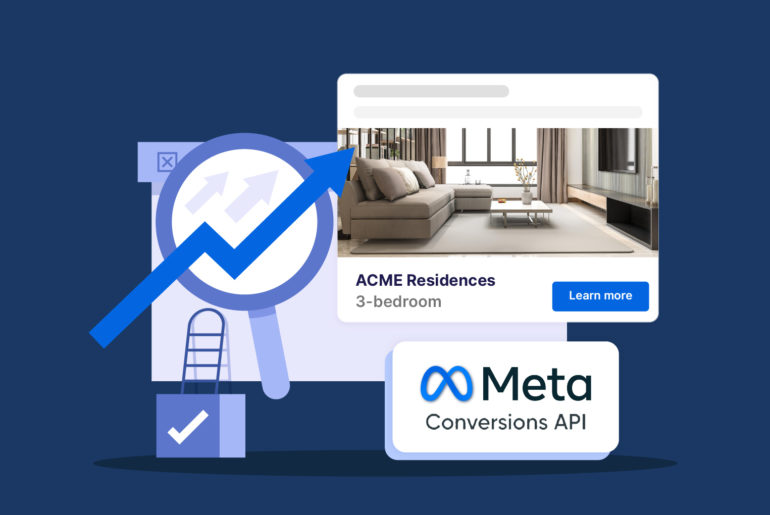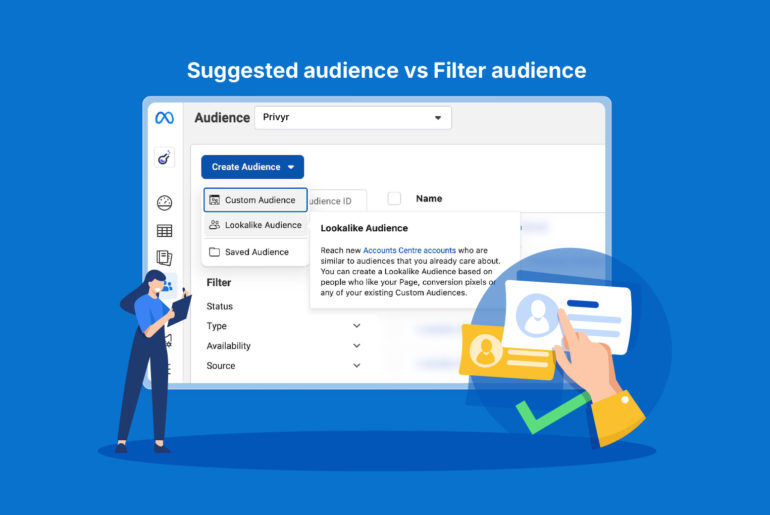Known for its stability, modern infrastructure, and strong regulatory framework, the Singapore real estate industry presents exciting opportunities for real estate agents. However, it’s also a highly competitive industry.
Higher competition means you’re competing with all the other agents for the same lead. Therefore, you’ll want to generate as many leads as you can for your property listings. But how to achieve this without breaking the bank?
In this post, we’ll explore the most important platforms and methods for lead generation for property agents in Singapore. We’ll also discuss how to maximise your conversion rate with a simple trick.
How to generate real estate leads in Singapore
Doing lead generation for property agents in Singapore, the first step is to identify where your potential clients are likely to be. Fortunately, there are many online platforms in Singapore that attract potential real estate prospects, ranging from social media platforms to property portals.
However, simply posting your listings online may not be sufficient to generate enough quality leads. It’s important to be proactive in your lead generation efforts, which includes posting frequently, building your network, and building relationships with potential customers. Here are some methods to consider:
Method 1. Generating leads organically
You can generate real estate leads organically on various online platforms. This includes your business website, social media platforms, and Singapore-based property portals.
Property Portals
Singapore-based property portals, such as PropertyGuru, 99.co, EdgeProp, SRX, etc. attract a large number of potential real estate clients. These portals provide a comprehensive range of property listings, map-based search, neighbourhood guides, property valuation tools, data analytics, and many more. You can list your properties on these portals for free and connect with potential buyers.
That being said, keep in mind that just listing your property on these platforms doesn’t guarantee leads since everyone can benefit from these services. Optimising your listings and improving them based on data is essential in generating leads organically from these portals. This includes addings appropriate keywords, posting high quality images, and adding detailed descriptions among many. Here are some tips:
- Ensure that your property listings are detailed and accurate.
- Include high-quality photos and detailed descriptions of your listing.
- In the description and title, add relevant keywords that potential buyers might search for. For instance, putting “Fully furnished 2 BHK apartment for sale in Woodlands” is much better than “2 BHK apartment for sale.”
- Most property portals provide analytics tools for you to track the performance of your listings. Use this data to refine your approach and focus on what works best.
- Encourage your past clients to leave positive reviews and ratings. Social proofs can play a crucial role in boosting your credibility and attracting leads with genuine interests.
Social Media
Popular social media platforms offer great opportunities for generating real estate leads in Singapore. Since these platforms are visited by a large number of people, there’s a good chance that some of these users are looking for properties.
However, generating leads on social media organically is not as straightforward as on property portals. On social media, you can’t simply post your listings and wait for inquiries to come in. First, you’ll need to create a business page and build your audience, targeting the right people to build your reach and following. The good news is that once you gain momentum, social media can be a much more sustainable source of leads. Also keep in mind that different social media platforms cater to different types of audiences.
Here are some tips on generating leads organically on different social media platforms:
- Publish content consistently: Most social media algorithms are designed to favour consistent content. Consistency is key in effectively conveying your message to your target audiences. When posting, ensure you’re not just focusing on listings, but also providing problem-solving and useful content for potential real estate customers.
- Engage with followers: Interact with your audience by responding to comments and messages. If you can manage time, host live Q&A sessions to address common concerns.
- Join groups: Join local groups where people discuss property buying, selling, and renting. Sharing valuable insights can help you position as an expert and attract potential leads.
- Post articles: Professional platforms like LinkedIn allow you to post articles. Posting articles with useful information and insights about the real estate industry in Singapore can help you gain the attention of professional clients.
SEO and content marketing
SEO (Search Engine Optimization) and content marketing refer to combined strategies aimed at increasing your online visibility and attracting organic traffic. These strategies are primarily applied to your business website. However, you can also use these strategies elsewhere, such as property portals and social media.
SEO involves optimising your website’s content and keywords to rank higher in search engine results. This plays a great role in making your business more discoverable to potential customers. Content marketing, on the other hand, focuses on creating and distributing relevant and consistent content to attract and engage a real estate audience. Content marketing aims to provide useful information, build brand authority, create trust signals, and drive customer actions.
Here’s a basic strategy for SEO and content marketing:
Step 1. Research keywords: Research keywords that potential clients might use when searching for properties. These could include terms like “luxury condos in Singapore,” “HDB flats for sale,” or “property investment tips.” Tools like Google Keyword Planner, SEMrush, or Ahrefs can help you find keywords that your potential customers look for. If you’re a beginner, aim for high-volume, low-competition keywords.
Step 2. Distribute keywords: Once you identify keywords, add them across your website, blog posts, listings, and social media posts or make content around them – but make sure to retain a natural voice in your content. Here are some places where you should add keywords for search engines to notice your content:
- Title Tags and Meta Descriptions.
- Headers of your articles, property portal listings, and social media posts.
- Body of blog posts, property listing descriptions, and social media posts descriptions. If you’re creating video content posting them on social media such as YouTube and TikTok, make sure the description section has these keywords.
- URL Structure.
Step 3. Optimise your website for technical SEO: Identifying your keywords and distributing them across different marketing channels may not be enough since search engines also determine other technical factors to detect your website. Therefore in the next step, ensure you implement technical SEO strategies on your website. This includes ensuring your website loads quickly, is mobile-friendly, and has a secure HTTPS connection. Free tools like Google Search Console can help you monitor and resolve any crawl errors or indexing issues.
Method 2. Generating leads via paid promotion
Paid promotion is a faster way to generate leads for your property listings. It’s probably the most effective way if you’re yet to build a strong online presence. However, paid promotion is temporary and more expensive, plus your promotions may only work for the specific listing you wish to promote.
You can run ads on property portals, social media, and search engines and quickly generate leads for your business.
Property portals
Most property portals allow you to promote your listings through paid plans, such as standard listings, premium listings, and featured listings. Alternatively, you can run banner ads and sponsored content on these platforms.
Promotions boost the visibility of your listings or services. However, keep in mind that increased visibility doesn’t always guarantee more leads; it depends on the quality of your promotional materials and the listing itself. Therefore, always ensure your ad/promotion is well-written and includes all the necessary keywords.
Social media
Social media platforms, specifically Facebook, are also great places to promote your real estate listings. Facebook Lead Ads are a type of ad designed specifically for generating leads. These ads can be effective for promoting a property or new project at all stages, whether before the launch when there is less awareness, or after the launch when competition is high. Again, paid promotions can boost your visibility. However, your success in generating a substantial number of leads depends on how well you design the ad.
Depending on your target audience, you can also run lead generation campaigns on other popular social media platforms like LinkedIn and TikTok. These platforms cater to different types of audiences compared to Facebook, but if you have a specific offer for these groups, you can leverage these platforms to generate leads.
Search engine
If you’re looking to promote your properties on search engines, Google Ads is your best bet. Like Facebook, Google also offers ads specifically designed to generate leads, known as Google Ads Lead Form Assets. Google Ads on search engines operate based on keywords. This means you’ll be running ads on Google according to what people search for online.
For instance, if you’re targeting the keyword “brand new condos in Trinity Towers,” your lead ads will appear to people searching for that exact term. Therefore, running lead ads on Google using lesser known search terms may not produce the desired results.
Method 3. Networking and relationship building
If you have been creating and maintaining connections with relevant individuals and businesses, you have an excellent chance of generating some quality leads from these connections. If you haven’t already networked with other agents, investors, and professionals in related fields like mortgage brokers and home inspectors, it’s time to go for it. Good relationships can lead to referrals, partnerships, and increased business opportunities.
Attend networking events such as industry conferences, local business gatherings, and real estate expos. These are the places where you have an opportunity to meet fellow agents, industry leaders, and even potential clients. Good thing about attending and participating in these events is that apart from expanding your professional network, you’ll also stay updated about market trends.
Method 4. Traditional marketing
While digital marketing today is much more efficient, some traditional methods can still be very effective, especially if you’re looking to reach specific demographics. Various offline techniques such as print advertising, direct mail, signage, and in-person events can still be useful to promote your properties and services.
For instance, if you’re targeting a specific neighbourhood, try collaborating with local businesses like plumbers and electricians from that community. Create magnetic emergency contact flyers that people can attach in their refrigerators and promote your services together. Alternatively, direct mail, signage, and free merchandise like keychain can also help you generate leads. While using offline marketing techniques, focus more on your services over particular property that you might be promoting at that time.
Method 5. Online and offline lead magnets
Lead magnets are free incentives you can offer to potential clients in exchange for their contact information. People love free useful stuff and they won’t hesitate to share their contact information in exchange for them. Online lead magnets for real estate might include downloadable e-books, market reports, or access to exclusive property listings. Offline lead magnets could be free property valuations, free property tour, or home staging consultations. These strategies not just help capture leads but also kick-off your relationship-building process.
Free seminars and webinars that share insights on topics like real estate market trends, home buying/selling tips, or investment strategies can also be good ways to generate leads. These events help you showcase your expertise and build your relationships with potential clients.
Potential lead generation places you might not be aware of
While the popular platforms we discussed earlier are great for generating leads, there might also be many real estate lead generation opportunities outside of them. The key is to identify possible places where your potential clients hang out. Here are some potential lead generation place you might not be aware of yet:
- Local community and expat forums: Expatriates make up a good portion of real estate clients in Singapore. Forums such as Expat Living and Singapore Expats can be valuable channels for reaching expatriates and specific communities interested in property investments or rentals. Additionally, local community groups can also be a great place to find potential real estate clients.
- LinkedIn and professional networks: Professional networks like LinkedIn are powerful tools to generate real estate leads in Singapore. Join groups related to real estate, investment, or Singapore-specific interests, network, and share your listing with a professional audience.
- WhatsApp and Telegram groups: WhatsApp and Telegram are widely popular messaging apps in Singapore, and there are many dedicated groups for real estate discussions in these apps. These groups can be an effective way to reach potential clients.
How CRM can maximise your lead conversion rate
Well, generating leads is not the main goal here; it is only the first step in your real estate sales process. The next and more important step is to convert your leads into customers. However, as mentioned earlier, Singapore real estate is a highly competitive industry and your leads are likely communicating with many of your competitors as well. Converting them can be really challenging if you’re not running your sales process smoothly. This is where a CRM is essential.
Reaching out to new leads quickly, following up on time, and personalising communication are some of the most important strategies to improve your chances of converting leads. Additionally, you’ll also want to manage your leads data in a central location, automate repetitive tasks, and make data-driven decisions. A CRM can easily help you achieve these goals.
If you’re looking to run your entire sales process from your phone, look no further than Privyr. Privyr is a mobile-first CRM that allows you to quickly access your leads from any of your lead sources, so you can contact them on popular messaging apps like WhatsApp and Telegram within a few seconds. With Privyr, you can easily manage your entire sales process from wherever you are. The app can help you streamline your follow-up tasks to boost your sales by up to 300%.
Here’s how to use Privyr to streamline your sales process:
Step 1. Create your account and download the app
Visit Privyr and create your account by clicking Sign Up. Install the Privyr app on your mobile device after creating your account. Privyr is available on App Store and Google Play Store for both iOS and Android devices. Then, launch the app and sign in.
Step 2. Connect lead sources
In the app, tap on Account and select Integrations.
You’ll find all the lead sources that you can connect with Privyr under the Lead Sources tab. The connection will allow you to automatically receive instant alerts and lead details on your phone whenever you receive a new lead on lead sources. Select your lead source and tap on Configure/connect.
This will redirect you to the lead source’s app or website. Click on continue. This will integrate Privyr with your lead source. Repeat the same process for all the lead sources you have been generating leads from.
The process of connecting lead sources may be different depending on the platform. Just select your lead source and follow the instructions.
Once you’ve integrated Privyr with your lead sources, you don’t have to do anything. Privyr will automatically build a lead management system for you.
- You’ll have a central location for all your leads, regardless of the source.
- You’ll receive real-time mobile alerts for new leads generated from all your lead sources.
- You can instantly access the leads details and contact them on all communication channels – no need to type, copy-and-paste, or save contacts to your phonebook.
- You can save,select, and send auto-personalised messages for each lead in just one tap without needing to type any messages.
- The app will automatically schedule follow-up reminders for each lead.
- If you work in a team setting to coordinate on sales, you can easily distribute leads to your team members in a few taps.
Conclusion
The road to better conversion starts with quality lead generation. Generating high quality leads ensures your time and resources are invested in finding prospects with a genuine interest in buying or selling properties. This approach not only leads to higher conversion rates, but also creates a more efficient sales process.
To ensure you’re generating the right leads, research your potential customers and use targeted marketing strategies. Target precise demographics and location and use data analytics to understand buyer behaviour. You can further filter leads through initial consultations, but it’s always best to attract genuine interests from the beginning. If you’re looking to streamline your sales process and improve your real estate conversion rate, use Privyr – it’s super easy to set up and even easier to use. Try it for free today.






